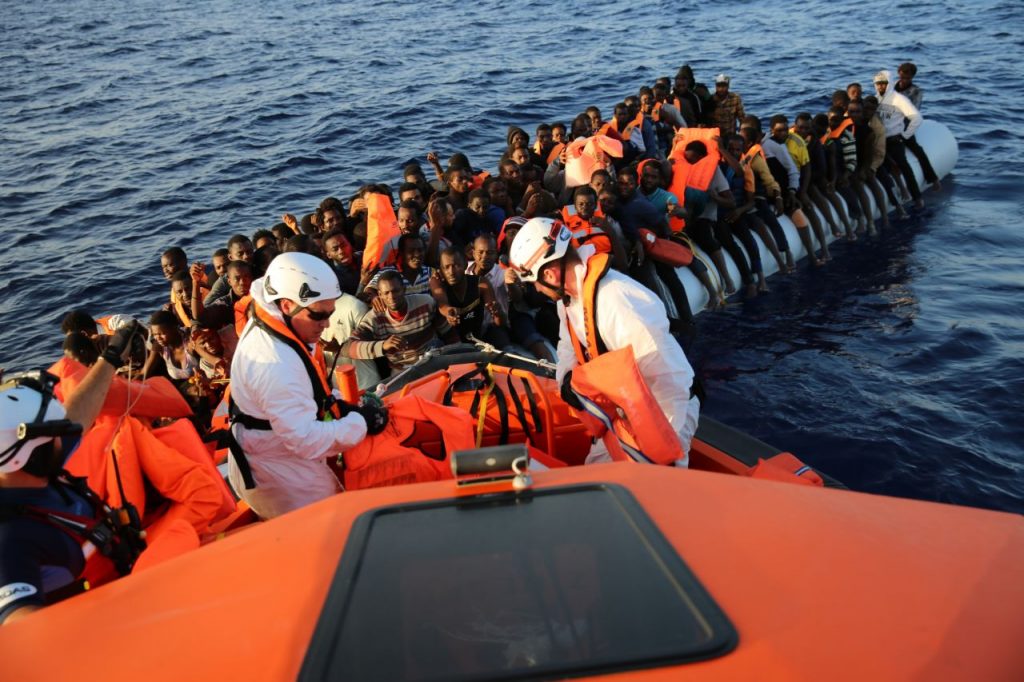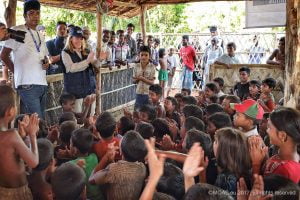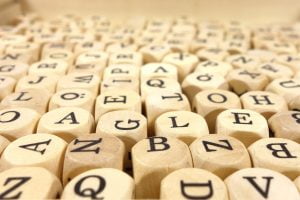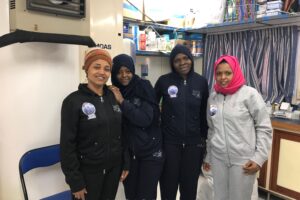Social media and newspapers report of two shipwrecks which is understood to have occurred between 22nd and 23rd March, killing around 300 people. We will never know the real death-toll, since we only have estimates and no-one was aware of them being in distress at sea.
We only became aware of the tragedy after the NGO ProActiva Open Arms recovered the bodies of 5 victims close to two capsized dinghies. According to the Italian Coast Guard, no SOS call had been sent.
The Mediterranean Sea used to be a bridge among different cultures, but it is now becoming a mass grave where people die silently, far from the eyes of those who criticize the work of SAR missions run by the civil society at sea.
Nevertheless, the situation is not much better on land.
Since March 22nd, a young Nigerian man, aged 25, has been fighting for his life in the intensive care unit of Infermi hospital (Rimini, Northern Italy).
We don’t know much about the identity of this young man, who arrived last September in Sicily and was soon after moved to Rimini.
We know his name – Emmanuel Nnumani– but we don’t know if he has a family waiting for him in Nigeria or living in Italy. We do not know his dreams, hopes and wishes. But we do know that he was aggressively assaulted and almost killed by a man who used racist words against him.
Racism appears to be the triggering factor of this awful attack. This should lead us to a deeper reflection, as members of civil society together with official authorities.
Unfortunately similar attacks –both verbal and physical- are on the rise and their victims are people who simply don’t look Italian, or have a different skin colour. This alone appears to have become a ground for discrimination.
Last year in July, another man from Nigeria aged 36, Emmanuel Chidi Namdi, was killed after trying to protect his girlfriend from racist insults made by the very same person who murdered him soon after.
On March 15th, the lifeless body of a young Somalian man, who was aged just 19 and called Maslax Moxamed, was found hanged in a park close to the refugee centre where he was living in Pomezia (close to Rome). Maslax ended up there after being returned from Belgium to Italy in compliance with the Dublin regulation. He arrived in Italy in August 2016 and then joined his sister living in Belgium, but the Dublin Regulation prevented their family reunification from becoming a reality.
Maslax’ suicide reminds me of what happened in Venice few months ago. On that occasion a young asylum seeker name Pateh, from Gambia, committed suicide by jumping into the cold waters of the lagoon in front of many tourists.
Beyond each isolated and dramatic episode, we are getting more and more used to aggressive words and verbal violence, which are such a poison for our society as a whole. We are increasingly used to being indifferent and distant from the others.

From politics to every other field, migrants and asylum-seekers are addressed with denigratory words, and accusations against those who are committed to help them are also on the rise. Those arriving in Italy become numbers with no history nor identity, and we expect them to accept every living or working condition simply because they had the chance to be safe.
We forget they are people like us.
Emmanuel Nnumani maybe has a mother in Nigeria and who doesn’t know where her son is. Emmanuel Chidi Namdi had a girlfriend and they were trying to rebuild a new life far from Boko Haram’s violence. Maslax Moxamed was just a boy – like our own children – but unfortunately he was born in a country unable to offer him a decent life. Pateh had gone through thousands of dangers before committing suicide in Venice lagoon.
These are all different stories with one single element in common: the victims had arrived in Europe looking for peace and safety, but Europe has proved to be unable to welcome them.
Those who arrive in Italy after awful journeys have a huge burden of pain and hope. We can’t ignore this.
To build a better society we have to be able to welcome those who arrive in our country with nothing but a strong ambition to improve their lives. We must create an adequate legal and social environment to integrate them in our society without any kind of marginalization.
We cannot accept the spread of verbal violence, as we have seen how often it culminates in physical violence.
Words can harm as much as weapons, as confirmed by the currently escalating violence against migrants and asylum-seekers who are an extremely vulnerable part of our society.
Let’s use words to build bridges, to tear walls and prejudice down, to create a welcoming society where nobody feels marginalized. Do not use words to divide and fuel hatred.
I wish Emmanuel Nnumani a speedy recovery, and that he finds in Italy the peace he could not find in his homeland.
Finally, I hope that the humanitarian protection given to him will be the starting point for a real integration process in Italy. As stated by the City Council in Rimini, he cannot be left to face the future alone.
This article was originally written in Italian.



